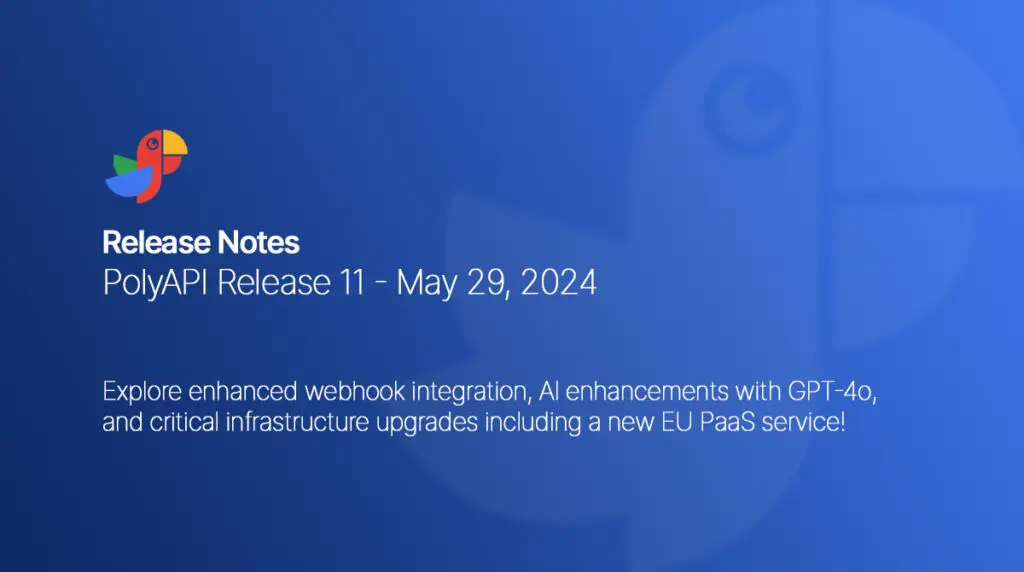The latest PolyAPI update, Release 11, introduces a range of powerful features and improvements designed to elevate the user experience, streamline API management, and enhance overall system performance. This release brings new capabilities to Node, Java, and Python clients, significant enhancements to the Poly UI, advanced AI services, and improved infrastructure and developer tools.
Node Client
Webhook Registration from OpenAPI Spec
We’ve added the ability to train webhooks directly from OpenAPI specs, making it easier to integrate and automate webhook functionalities.
Improved Error Messaging and Handling
The TypeScript setup now provides clearer error messages, making it easier to diagnose issues. Additionally, error handling during library generation has been hardened to skip generation issues and log errors appropriately.
Code Snippet Management
A new feature in the VS Code extension and Node client allows for systematic creation, publication, and management of reusable snippets, streamlining development processes.
Bug Fixes
- TS Strict Mode: Fixed compatibility issues with strict mode by renaming functions, resolving execution failures in projects using the ‘use strict’ directive.
- Context Filter: Resolved an issue with the
npx poly generate –contextsoption not correctly filtering public tenant contexts. - Interface Type: Fixed a bug where methods did not return the expected type due to missing index signatures in type definitions.
- Server Function Response: Resolved an issue where server functions returning void were incorrectly returning a generic response object.
Python Client
Function Naming
Python server function containers now use function IDs as part of their names, simplifying debugging and identification.
Bug Fixes
- Compatibility Issue: Fixed issues with functions trained using OpenAPI Specs that were not stored correctly using
http://json-schema.org/draft-06/schema#. - Webhook Callback Argument Types: Ensured webhook callback functions receive the correct argument types instead of ‘Dict’ types.
- Title Casing in TypedDicts: Generated type names are now maintained as programmatically defined and not altered during client generation.
Java Client
polyCustom Support
Introduced support for setting specific response status codes and content types through ‘polyCustom’ in Java server functions.
Function Wakeup Time
Deployment and wakeup times have been improved by respecting pom context filters and automatically detecting dependencies during Java function deployments.
Error Handler
Added support for an error handler module to capture and deliver errors from Poly Server to the Java client via websockets.
Bug Fixes
- Java Functions: Resolved an issue where strings in Java function responses were incorrectly treated as
text/htmlby default when invoked using a Webhook -> Trigger -> Server Function.
Canopy Service (Poly UI)
Expanded Management UI
The Management UI now includes Users and API keys pages for better administration and control.
Application Name Update
The Poly UI app has been renamed to ‘PolyAPI’, with the app name and preview text now configurable for enhanced customization.
Context Visibility
Added the ability to display context in list views, with configurable visibility for item cards, showing ‘name’ and ‘description’ by default.
Configuration Endpoint Update
Moved application configuration details to applications/{id} endpoint from /applications.
Permissions
Introduced ‘manageApplications’ and ‘useApplications’ permissions for managing and accessing applications within the Canopy environment.
Application Management API
Refactored Canopy applications to use /tenant/:id/applications object, simplifying administration.
Canopy Access
Updated the URL to access the Canopy UI to /canopy/{appId} or /canopy/{subpath}, allowing access by application ID or user-defined subpath.
Bug Fixes
- Canopy Type Handling: Added explicit variable type handling to maintain original types during updates. Renamed ‘raw’ to ‘string’ for better clarity.
AI Services
Updated to GPT-4o
Poly AI now utilizes GPT-4o, offering enhanced speed, quality, and reduced costs, significantly improving function match performance.
Simplified Plugin Configuration
Removed deprecated ChatGPT UI-related fields, simplifying the plugin configuration process.
AI Assistant Endpoint
Introduced /assistants/{slug}/conversations/{conversationSlug} paths to manage conversations, replacing the old subdomain approach and supporting GET, POST, and DELETE operations.
AI Language Setup
Automatically sets the default language based on the VS Code extension setup, ensuring accurate language and query handling.
Developer Experience
PolyAPI Documentation
Launched the PolyAPI Documentation site to assist new users in getting started with Poly. It includes guides on signup, client generation, using out-of-the-box functions, training functions, and deploying server functions.
Postman Script Enhancement
Improved Postman pre-request scripts with a ‘YourAPIKeyHere’ placeholder and added error messages prompting users to set their API key if unchanged.
Webhook Handler
Enhanced functionality for copying webhook handler functions from the tree, including { waitForResponse: false } by default.
Bug Fixes
- Postman Training Improvement: Fixed a bug where authorization arguments were duplicated if the authorization argument was not called
bearerToken.
Infrastructure/DevOps Improvements
GA of EU1.polyapi.io
Established a new PaaS service in the EU region (Ireland) to enhance performance, privacy, and reduce latency for customers in Europe and surrounding regions.
SOC 2 Type 1 Certification
Achieved SOC 2 Type 1 compliance, certifying adherence to security and privacy standards.
Server Function Dashboard
Introduced a dashboard for easy access to server function information, initially available to self-hosting customers and eventually to PaaS users. The dashboard includes filtering options by names, contexts, tenant environments, current state, logging state, and timestamps, along with charts showing the number of functions across all tenants.
Advancing API Management
Release 11 of Poly API marks a significant step forward in enhancing API functionality, user experience, and system performance. These updates reflect our commitment to providing robust, flexible, and user-friendly solutions for developers and organizations alike.
For more details, visit our documentation site or contact our support team. Your feedback is crucial as we continue to innovate and improve Poly API.
